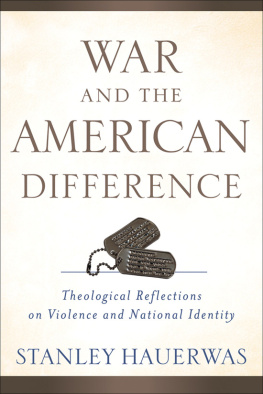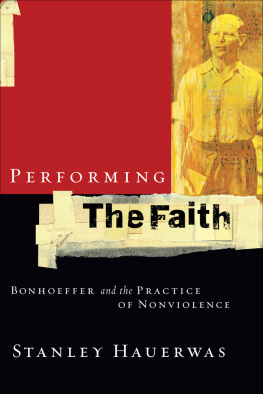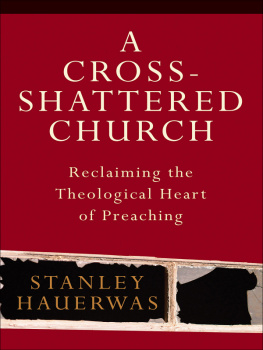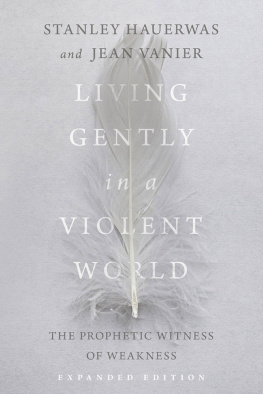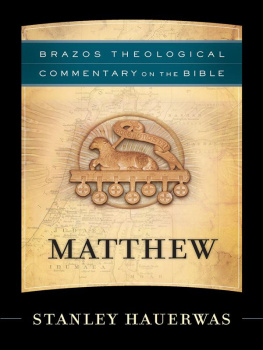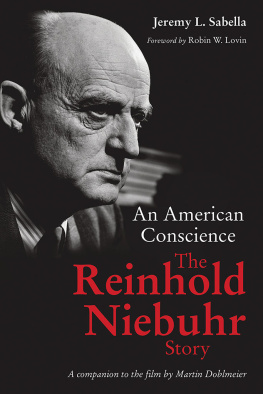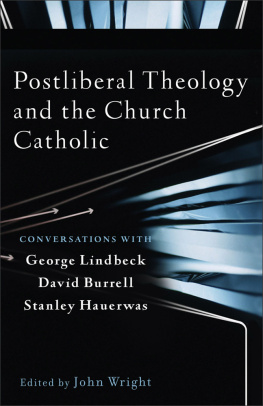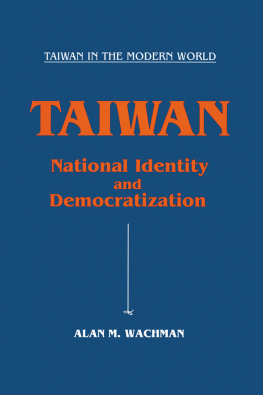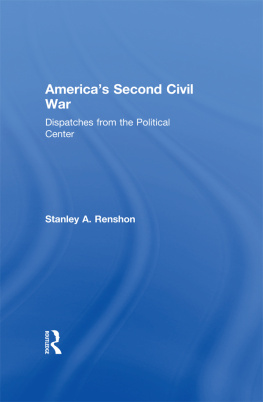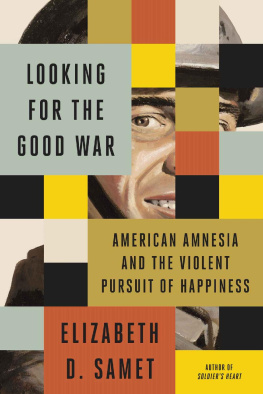Stanley Hauerwas - War and the American Difference: Theological Reflections on Violence and National Identity
Here you can read online Stanley Hauerwas - War and the American Difference: Theological Reflections on Violence and National Identity full text of the book (entire story) in english for free. Download pdf and epub, get meaning, cover and reviews about this ebook. year: 2011, publisher: Baker Publishing Group, genre: Politics. Description of the work, (preface) as well as reviews are available. Best literature library LitArk.com created for fans of good reading and offers a wide selection of genres:
Romance novel
Science fiction
Adventure
Detective
Science
History
Home and family
Prose
Art
Politics
Computer
Non-fiction
Religion
Business
Children
Humor
Choose a favorite category and find really read worthwhile books. Enjoy immersion in the world of imagination, feel the emotions of the characters or learn something new for yourself, make an fascinating discovery.
- Book:War and the American Difference: Theological Reflections on Violence and National Identity
- Author:
- Publisher:Baker Publishing Group
- Genre:
- Year:2011
- Rating:5 / 5
- Favourites:Add to favourites
- Your mark:
- 100
- 1
- 2
- 3
- 4
- 5
War and the American Difference: Theological Reflections on Violence and National Identity: summary, description and annotation
We offer to read an annotation, description, summary or preface (depends on what the author of the book "War and the American Difference: Theological Reflections on Violence and National Identity" wrote himself). If you haven't found the necessary information about the book — write in the comments, we will try to find it.
War and the American Difference: Theological Reflections on Violence and National Identity — read online for free the complete book (whole text) full work
Below is the text of the book, divided by pages. System saving the place of the last page read, allows you to conveniently read the book "War and the American Difference: Theological Reflections on Violence and National Identity" online for free, without having to search again every time where you left off. Put a bookmark, and you can go to the page where you finished reading at any time.
Font size:
Interval:
Bookmark:

2011 by Stanley Hauerwas
Published by Baker Academic
a division of Baker Publishing Group
P.O. Box 6287, Grand Rapids, MI 49516-6287
www.bakeracademic.com
Ebook edition created 2011
All rights reserved. No part of this publication may be reproduced, stored in a retrieval system, or transmitted in any form or by any meansfor example, electronic, photocopy, recordingwithout the prior written permission of the publisher. The only exception is brief quotations in printed reviews.
ISBN 978-1-4412-3815-3
Library of Congress Cataloging-in-Publication Data is on file at the Library of Congress, Washington, DC.
Unless otherwise indicated, Scripture quotations are from the New Revised Standard Version of the Bible, copyright 1989, by the Division of Christian Education of the National Council of the Churches of Christ in the United States of America. Used by permission. All rights reserved.
Scripture quotations marked KJV are from the King James Version of the Bible.
To the Ekklesia Project
Ten years and counting. America has been at war for ten years and counting. It is almost difficult to recall a time when America was not at war. The Cold War may not have seemed like war, but there can be no doubt that it was appropriately named war. For those of us who have lived long enough to remember it, in some ways the Cold War seemed more real than the wars that ensued after September 11, 2001. The Cold War impinged on the daily lives of Americans, whereas the wars after September 11, 2001, have been fought without the general American population having to make any sacrifices. They go on, and so do we. Yet people are dying and people are killing. These wars are real.
Most Americans do not seem to be terribly bothered by the reality of the current wars. It is as if they have become but another video game. In truth, the wars themselves are increasingly shaped by technologies that make them seem gamelike. Young men and women can kill people around the world while sitting in comfortable chairs in underground bunkers in Colorado. At the end of the work day, they can go home and watch Little League baseball. I find it hard to imagine what it means to live this way.
The wars America has been fighting for ten years and counting seem so distant and vague that it is hard for any of us to deal with the reality of war. We celebrate and praise the heroism of those who fight, and we are saddened that some must make the ultimate sacrifice to preserve our freedom. Those so honored, however, do not necessarily think, given the reality of war, that they should be regarded as heroes. To be sure, those who are actually engaged in combatthose who see the maimed bodies and mourning mothersstruggle more than the rest of us to make sense of the reality of war.
It is my hope that this book will in some small way help us, Christian and non-Christian alike, to confront the reality of war. I write as one committed to Christian nonviolence, but I hope that what I have written here will be an invitation for those who do not share my commitments to nevertheless join me in thinking through what a world without war might look like.
The world, for good reason, may well think it does not need another book by me, but I make no apology for putting this book together. In the face of ongoing wars it is hard to know what to say, but I am determined to continue trying to articulate what it might mean to be faithful to the gospel. Like most of my work this book is exploratory, but I hope readers will find my attempt to reframe theologically how we think about war fruitful for their own reflection. Indeed, I hope I have said some of what needs to be said if we are to have an alternative to ten years and counting.
Im thankful that Rodney Clapp thought these essays to be important and worthwhile. When I sent them to Rodney I did so knowing he had the editorial imagination to envision them as a whole; and he did. As usual, I am in Rodneys debt, not only for making this book possible, but for suggesting that I have some Johnny Cash in my soul.
Im grateful to Adam Hollowell and Nathaniel Jung-Chul Lee, who proved invaluable in getting these essays ready for publication. Early on, when I first began thinking of this collection, Adam spent time reading and making insightful suggestions. That Adam has now completed his PhD and is currently a colleague at Duke is a great gift. Nate has helped with final revisions, which entailed his making substantive suggestions for the text as a whole. His determination to be a priest in the Episcopal Church is a gift to the church. Both of these young scholars are examples of what it means for the academy and the church to take seriously the realism of Christs sacrifice.
Carole Baker was the first reader of these essays. Without her none of the chapters in this book would have been ready to be read by others. She has read and reread what I have written for so long, she is now able to say what I should have said better than me. I continue to worry that having her work for me means she cannot pursue her work as an artist as fully as I think she should. But hopefully that day is not far off.
I have dedicated this book to the Ekklesia Project because though it is a quirky group of peopleand that includes meI think it may be the kind of gathering that helps us see what it could mean for Christians to love one another.
By the time this book appears I will be seventy years old. How strange. What a wonderful life I have been given. I have been loved by many friends and I am extremely grateful. But Paulas love for me has made all the difference.
This is a modest book with an immodest purpose: to convince Christians that war has been abolished. The grammar of that sentence is very important: the past tense is deliberate. I do not want to convince Christians to work for the abolition of war, but rather I want us to live recognizing that in the cross of Christ war has already been abolished. So I am not asking Christians to work to create a world free of war. The world has already been saved from war. The question is how Christians can and should live in a world of war as a people who believe that war has been abolished.
I am well aware that the claim that Jesus has abolished war will strike many as absurd. We live, as I just acknowledged, in a world of war. So what could it possibly mean to say that through his death and resurrection Jesus has brought an end to war? To live as if war has been abolished surely is a fools game. Philip Bobbitt must be right to argue that we cannot and, more importantly, should not try to imagine a world without war. Rather, we ought to think hard about the wars we should have fought for political reasons so to avoid wars that lack political purpose.
Bobbitts presumption that there is no alternative to war reflects a humane and profound understanding of our common lot. He is no lover of war. He is not a cynic or a nihilist. He does not believe when all is said and done that we must live as if the bottom line is to kill or be killed. Bobbitt simply accepts the world as he finds it, that is, a world in which war, like birth and death, is simply a fact of life. He sees his task, a moral task, as helping us to understand the possibilities as well as the limits of such a world.
The problem with Bobbitts defense of what he considers the real world of war is that there is another world that is more real than a world determined by war: the world that has been redeemed by Christ. The world that has been redeemed by Christ has an alternative politics to the constitutional orders that Bobbitt thinks are established by war. The name for that alternative politics is church.
Font size:
Interval:
Bookmark:
Similar books «War and the American Difference: Theological Reflections on Violence and National Identity»
Look at similar books to War and the American Difference: Theological Reflections on Violence and National Identity. We have selected literature similar in name and meaning in the hope of providing readers with more options to find new, interesting, not yet read works.
Discussion, reviews of the book War and the American Difference: Theological Reflections on Violence and National Identity and just readers' own opinions. Leave your comments, write what you think about the work, its meaning or the main characters. Specify what exactly you liked and what you didn't like, and why you think so.

